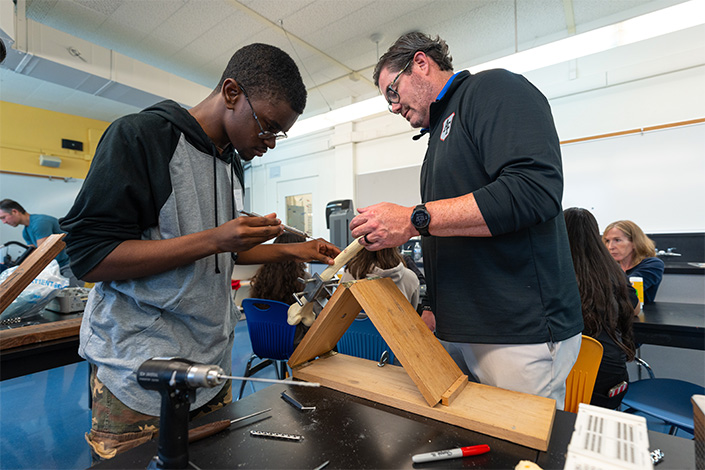From UC San Diego to Capitol Hill
Advocating for diversity and equity in STEMM education.
Published Date
Article Content
This story is from the 2025 issue of Discoveries, a UC San Diego Health Sciences magazine.
Each of us has a unique story. Our family, our history, our journey and our experiences all come together to create the various chapters of that story.
Mayra Mendiola will tell you her story starts with her identity. She is a proud daughter of Mexican immigrants. She is a first-generation, low-income Latina college student interested in a career in STEMM (science, technology, engineering, math and medicine). She is also a Class of 2024 graduate of UC San Diego.
Her parents always encouraged her to study and work hard. She was determined to succeed and attend college to take advantage of an opportunity that her parents never had.
“In high school, I looked around my community and saw the need for equity and diversity in medicine and health care,” said Mendiola. “Equity and diversity in STEMM is so important for our families and communities that see us and what we are doing. They see that we are capable of being successful outside of the stereotypical roles society has defined for us. They see that we too can succeed in STEMM, which makes them proud and even more interested in STEMM.”
She knew she was capable, but having the means to attend college was a bit of a challenge for Mendiola. A native of San Diego, her journey to UC San Diego was accelerated with the assistance of the university’s Pathways to STEMM Through the Enhanced Access and Mentorship (PATHS) program. PATHS is a four-year undergraduate scholarship and student support program that provides an annual scholarship, enhanced access to stratified mentorship, campus support, hands-on training and academic preparation support. The program’s all-access model for support, empowerment and professional exposure encourages a new, diverse generation of STEMM leaders.

In June, during her last week of undergraduate studies, Mendiola was invited to travel to Washington, D.C., with UC San Diego Chancellor Pradeep K. Khosla; Gentry Patrick, PHD, PATHS faculty director and director of the Sanford Institute's Center for Empathy and Social Justice in Human Health; Eric Jordahl, graduate student in biology and vice chair of the Biology Undergraduate and Master’s Mentorship Program (BUMMP); and Leigh Eck, center strategist and PATHS co-creator.
The central focus of the trip was to spotlight UC San Diego’s work to expand career pathways for underrepresented students pursuing opportunities in the STEMM fields and to encourage policymakers to make additional federal investments in programs like PATHS and BUMMP that support the development of a future STEMM workforce that will save lives, drive innovation and deliver economic growth.
“PATHS has done a lot for me personally,” said Mendiola. “Traveling to D.C. was a great opportunity for me to give back. Being able to give voice to how important these types of programs are for students who come from underrepresented backgrounds was my way of giving back and acknowledging my experiences.”
"Being able to give voice to how important these types of programs are for students who come from underrepresented backgrounds was my way of giving back and acknowledging my experiences."
While in the nation’s capital, Mendiola and the rest of the UC San Diego contingent met with key policy advisors for local representatives, including U.S. Representative Juan Vargas and U.S. Senator Alex Padilla, whose previous support led to a congressionally directed funding award totaling $1.65 million for PATHS that was included in the federal government’s spending bill.
Acknowledging the national need for these investments, policymakers like Senator Padilla and Representative Vargas have demonstrated steadfast commitment to supporting underrepresented students in STEMM, a partnership that ultimately led to this opportunity to showcase the success of UC San Diego programs like PATHS and BUMMP.
“While there, we discussed the PATHS and BUMMP programs as successful innovative models for holistically supporting diverse students in STEMM education,” said Patrick, professor of Neurobiology and the Kavli and Dr. William and Marisa Rastetter Chancellor’s Endowed Chair in Neurobiology. “We asked these elected officials to consider legislation that bolstered support for programs like these and discussed the center’s research on the science of belonging, which examines how a sense of belonging is a key indicator in students’ physical, emotional and psychological well-being, and their academic success — an outcome central to both programs.”
They also met with Deputy Secretary of Education Cindy Marten and White House Hispanic Initiative Executive Director Melody Gonzales to discuss belonging as a key program outcome of, and essential metric for, student success in STEMM education.
“A lot of what we did in Washington, D.C., was really just talking,” said Mendiola, who graduated summa cum laude with a bachelor’s degree in human biology and a minor in Chicanx/Latinx studies. “To really support and retain students from underrepresented backgrounds in STEMM, we need policies that reflect the population that those policies will affect. I hope that my story will stick with the leaders in D.C. as they make those policy decisions.”
Being invited to speak with national leaders was an honor and privilege for Mendiola and others. U.S. Representative Scott Peters, who represents UC San Diego, and his staff were instrumental in facilitating the meetings.
“We truly appreciate Team Peters’ commitment to sharing the message of the public research university and the role universities play in driving innovation and economic growth,” said Khosla. “As a world-class public research university and academic health center, UC San Diego is committed to excellence in education, research, health care and community engagement. Our campus is a vibrant hub of innovation, creativity and diversity. It is a place where students, faculty and staff come together and work across disciplines to tackle the complex challenges of our time.”
Showcasing UC San Diego’s commitment to cultivating underrepresented leaders, Chancellor Khosla noted that over the last 10 years, the university has doubled the number of underrepresented students who are studying on campus. Additionally, in 2022, UC San Diego achieved the U.S. Department of Education’s Asian American Native American and Pacific Islander-Serving Institution designation. And with 25% Latinx enrollment, UC San Diego is close to officially achieving the Hispanic-Serving Institution designation.
“Fundamentally, we believe that every single one of our community members deserves equitable opportunities to succeed,” said Khosla. “That’s why equity, diversity and inclusion is a core pillar of our strategic plan, with a focus on creating a more inclusive and diverse university community. Merging this commitment to equity with our reputation for institutional excellence in the STEMM fields presents unique opportunities to innovate for our campus.”
Students who come from underrepresented backgrounds bring unique perspectives in that they know firsthand the challenges and needs in their local communities. They are able to challenge the status quo to make change.
“The diversity of thought that underrepresented students bring to the university fosters innovation that goes beyond traditional approaches, leading to solutions that are inclusive, equitable and impactful on a broader scale,” said Patrick. “However, achieving such diverse representation first requires providing equitable opportunities for success. Without this equal opportunity for everyone to succeed, solutions risk excluding entire populations and perpetuating systemic inequities. Diverse representation ensures that solutions are designed with a broader perspective, preventing the continuation of biases and inequalities.”
Additionally, Patrick noted that the sooner we can begin to implement these types of policy changes, the better equipped we are to create meaningful reform and show the next generation that they matter and are part of the solution.
“By showing students and professionals that they belong, and their perspectives are valued and essential, we can not only address historical disparities but also enhance the overall effectiveness of STEMM fields in solving complex global issues,” said Patrick. “If we get it right for our most vulnerable, we get it right for everyone!”
Now in Baltimore, Mendiola is working in a pediatric oncology lab as a Postbaccalaureate Research Education Program (PREP) scholar at the Johns Hopkins School of Medicine as she determines her next step.
“I am continuing to learn,” said Mendiola. “I am here to grow as a scientist and individual, and plan to apply to graduate school. Wherever I end up, my goal is to work at the frontlines of research and medicine to promote equity and diversity in science and health care.”
Share This:
Stay in the Know
Keep up with all the latest from UC San Diego. Subscribe to the newsletter today.





